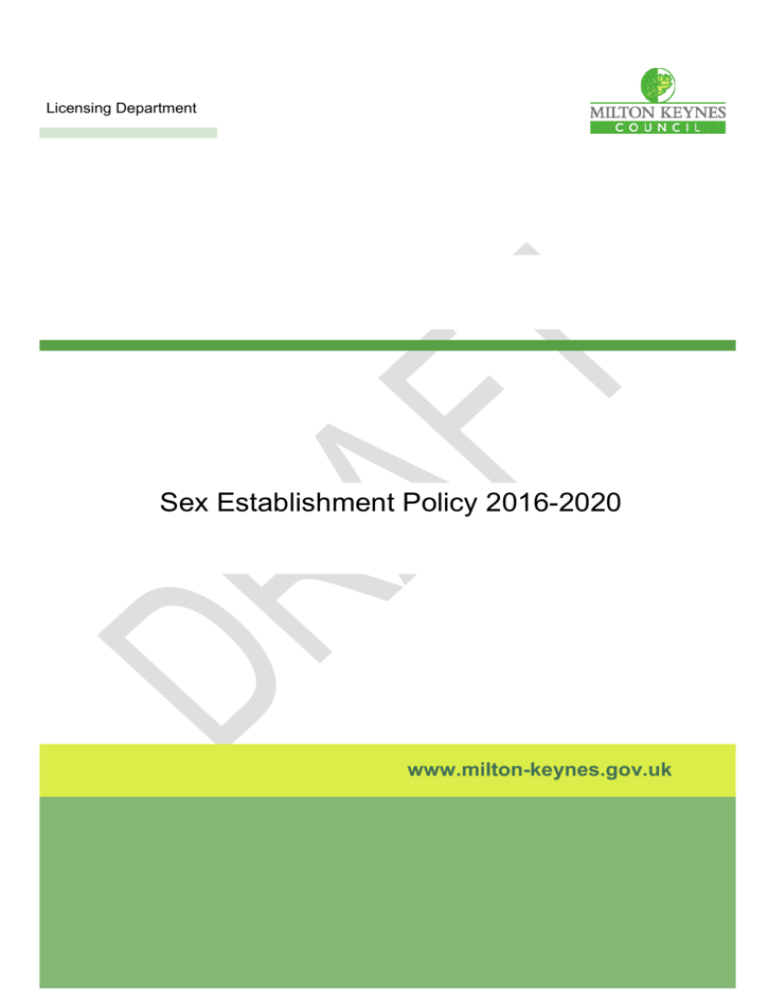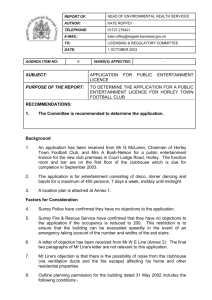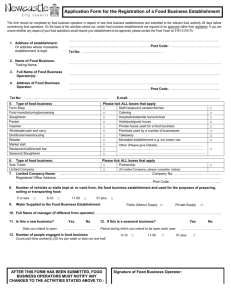
Licensing Department
Sex Establishment Policy 2016-2020
www.milton-keynes.gov.uk
MILTON KEYNES COUNCIL SEX ESTABLISHMENT POLICY
1.
The purpose and scope of this policy
1.1
This Sex Establishment Policy for Milton Keynes Council will set out the policy of
the Council with respect to carrying out its licensing functions for Sex
Establishments as adopted under Schedule 3 of the Local Government
(Miscellaneous Provisions) Act 1982, on 1 April 1983.
1.2
This policy incorporates the amendments that Section 27 of the Policing and
Crime Act 2009 made to Schedule 3 of the Local Government (Miscellaneous
Provisions) Act 1982, adopted by the Council on 16 March 2011. Section 27
effectively reclassifies lap dancing and similar premises as sexual entertainment
venues, thus requiring a sex establishments licence.
1.3
The aforementioned amendments allow local authorities and communities greater
power in determining whether sexual entertainment venues are permitted in their
locality and increases the controls available to be put on them. The policy reflects
the view of the Council that local citizens and businesses should be able to
determine whether sex establishments should be permitted in any particular area,
whilst allowing flexibility to consider the potentially conflicting needs of
commercial interests, patrons, employees, residents and communities.
1.4
The legislation defines Sex Establishments as sex shops, sex cinemas and
sexual entertainment venues.
1.5
This policy was prepared following consideration the relevant legislation,
Guidance issued by the Home Office and relevant bench marking exercises.
1.6
A public consultation to seek the views of Milton Keynes Citizens, elected MKC
Members, what the Council determines as ‘responsible authorities’ (Licensing
Authority, Thames Valley Police, Fire Authority, Public Health, Environmental
Health, Trading Standards, Planning), relevant night-time economy bodies and
current sex establishment licence holders was undertaken to inform this policy.
1.7
This Sex Establishment Policy will be reviewed at least every five years. Any
amendments will be subject to public consultation and endorsed by the
Executive.
2.
Sex Establishments
There are three types of sex establishments described by the legislation; Sexual
Entertainment Venues, Sex Shops and Sex Cinemas.
2.1
Sexual Entertainment Venues
2.1.1
Further to amendments provided by section 27 Policing and Crime Act 2009; a
sex entertainment venue can be defined as “premises at which relevant
entertainment is provided before a live audience for the financial gain of the
organiser or entertainer unless an exemption applies”. The exemptions are
defined fully in the legislation.
2.1.2
Relevant entertainment is broadly described as live performances and live
displays of nudity. These performances and displays would, ignoring financial
gain, be reasonably assumed to be provided solely or principle for the purpose of
sexually stimulating any member of the audience whether by verbal or other
means.
2.1.3
Examples of relevant entertainment will be likely to include, but not limited to:
i.
Lap dancing
ii. Pole dancing
iii. Table Dancing
iv. Strip Shows
v. Peep Shows
vi. Live Sex Shows
2.1.4
Although this list is not exhaustive, it is the relevant entertainment itself and not
the name that defines the activity. For example a fitness class based upon the
actions of pole dancing would not normally be considered a relevant
entertainment requiring a sex establishment licence.
2.1.5
A display of nudity would not automatically be considered to be provided solely or
principally for the purpose of sexually stimulating any member of the audience. If
a display of nudity forms part of a drama or dance performance in a theatre then
it would be unlikely to be classified as relevant entertainment. Such displays
would be considered on a case by case basis.
2.2
Sex Shop
2.2.1
A sex shop is defined as a premises used for a business consisting to a
significant degree selling, hiring, exchanging, lending, displaying, or
demonstrating relevant articles.
2.2.2
Relevant articles are defined as anything made for the use in connection with or
for the purpose of stimulating or encouraging sexual activity or restraint which are
associated with sexual activity.
2.2.3
Lingerie is not generally considered a sex article.
2.2.4
Although there is no single decisive factor used to determine whether a premises
is selling sex articles to a significant degree, the Council will consider the
following:
i.
The ratio of sex articles to others aspects of the business
ii. Absolute quantity of sales
iii. Character of the business
iv. Nature of the displays
v. Turnover generated by sales of sex articles compared to other sales
vi. Any other factors that may be relevant
2.2.5
A benchmark study on other local authorities has determined a guideline of 15%
Sex Establishment Policy -
-2-
is to be used as a guide when determining whether the sale, hire, exchange,
lending, display or demonstration of sex articles is considered significant.
However each premises and circumstances will be judged on its own merits and
the percentage will not necessarily be considered a decisive factor.
2.2.6
Any premises selling relevant articles in the form of films/ videos classified by the
British Board of Film Classification as R18 (a legally restricted classification
primarily for the explicit works of consenting sex or strong fetish material involving
adults) and/or similar magazines etc will be considered a sex shop.
2.3
Sex Cinema
2.4
A sex cinema is defined as a premises used to a significant degree for the
exhibition of moving pictures concerned with relevant images.
2.5
Relevant images are defined as images which deal with or relate to or be
intended to stimulate or encourage sexual activity, or acts of force or restraint
associated with sexual activity, or must portray or primarily deal with or relate to
genital organs or urinary or excretory functions.
2.6
Whether a premises provides a significant degree of relevant images is
determined quite simply in that any premises showing British Board of Film
Classification R18 film (a legally restricted classification primarily for the explicit
works of consenting sex or strong fetish material involving adults) images to a
public audience will require a sex cinema licence
3
Policy and Guidelines considered when granting a sex
establishment licences
3.1
Any application for a sex establishment for either a sexual entertainment venue,
sex shop or sex cinema will consider the definitions and issues identified above
and the following guidelines.
3.2
The Council will issue a neighbourhood consultation letter to all business and
residential premises within 50 metres of any new or variation application to a sex
establishment licence.
3.3
Under schedule 3 of the Local Government (Miscellaneous Provisions) Act 1982,
an application must not be granted:
i.
to a person under the age of 18;
ii. to a person who is for the time being disqualified due to the person
having had a previous licence revoked in the area of the appropriate
authority within the last 12 months;
iii. to a person, other than a body corporate, who is not resident in an
EEA State or was not so resident throughout the period of six months
immediately preceding the date when the application was made; or
iv. to a body corporate which is not incorporated in an EEA State; or
v. to a person who has, within a period of 12 months immediately
preceding the date when the application was made, been refused the
grant or renewal of a licence for the premises, vehicle, vessel or stall
Sex Establishment Policy -
-3-
in respect of which the application is made, unless the refusal has
been reversed on appeal.
3.4
Each application shall be considered on its own merit, following consultation with
the relevant Parish/ Town Councils, Ward Members, responsible authorities and
the public via a public notice.
3.5
Where an application does not receive any representation or representations are
resolved and the application is effectively non-contested, authority is delegated to
officers to grant the application .
3.6
Relevant objections will be considered by the Council when determining
applications. Parish/ Town Councils, Ward Members, responsible authorities and
any interested party can make objections. Objections will be considered relevant
where they follow the basis of paragraph 3.6 below.
3.7
An application may be refused on the following grounds:
i.
the applicant is unsuitable to hold the licence by reason of having
been convicted of an offence or for any other reason;
ii. if the licence were to be granted, renewed or transferred the business
to which it relates would be managed by or carried on for the benefit of
a person, other than the applicant, who would be refused the grant,
renewal or transfer of such a licence if he made the application
himself;
iii. the number of sex establishments, or of sex establishments of a
particular kind, in the relevant locality at the time the application is
determined is equal to or exceeds the number which the authority
consider is appropriate for that locality;
iv. that the grant or renewal of the licence would be inappropriate, having
regard—
a. to the character of the relevant locality; or
b. to the use to which any premises in the vicinity are put; or
c. to the layout, character or condition of the premises, vehicle,
vessel or stall in respect of which the application is made.
3.8
When considering whether a licence would be inappropriate, the following
Guidelines will be considered:
3.8.1
Only one sex shop and one other sexual entertainment venue in a
particular ‘locality’ is ordinarily permitted.
3.8.2
A licensed sex establishment shall not normally be situated within
‘inappropriate proximity’ to:
i.
a place of religious worship / education;
ii. a pre-school facility /school;
iii. a Higher education campus;
iv. any residential accommodation (including hotels);
v. an enclosed shopping mall, arcade or centre;
vi. a market;
Sex Establishment Policy -
-4-
vii. a public building open to the general public;
viii. a community meeting place;
ix. a community leisure facility;
x. a “Gateway” to an identifiable ‘locality’;
xi. a location where children may be at risk but not previously referred to
in (i)—(x) above; or
xii. a conservation area within the meaning of the Town and Country
Planning Acts.
Note:
‘inappropriate proximity’ is defined as the distance that, in the opinion of
the Regulatory Committee, is such as to result in serious local concern.
3.8.3
The premises exterior advertisement/ decoration will be agreed with the
Head of Regulatory Services, taking into consideration any advice from
the Planning Service as required.
3.8.4
The window/door glazing adjacent to, and visible from the public
highway (including a footway) should be obscured; and no part of the
interior should be visible when the entrance door is open
3.9
The status or decision of a planning consent can be taken into consideration as to
the grant or otherwise of a sex establishment licence.
3.10
The definition of ‘locality’ be determined by the Regulatory Committee for each
application on its merits.
3.11
Licenses will be granted for a 12 month period except in exceptional
circumstances
3.12
Standard conditions will be attached to all sex establishment licences as attached
to this policy unless alternative provisions are made to satisfy that conditions are
not required.
3.13
Additional special conditions can be added to applications where the Council
considers it necessary. These conditions may refer, but not be limited to: opening
hours, change of type of sex establishment etc.
3.14
Application forms are available on request from the Council.
3.15
Fees are set each year and are available on request from the Council.
Sex Establishment Policy -
-5-







